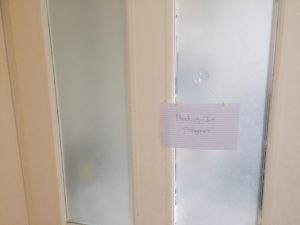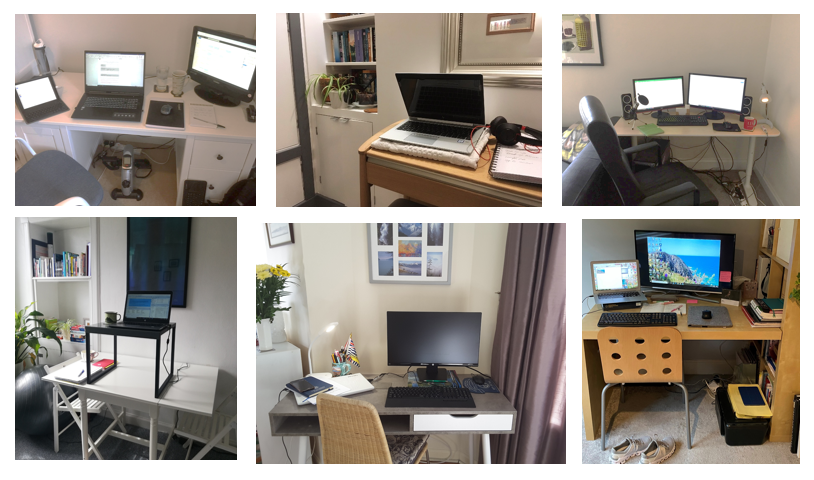The COVID-19 pandemic has meant that, along with the rest of the academic community, our team here at Edinburgh Health Economics (EHE) have also been learning to adapt to a life of working from home. In this post, we wanted to share some of how we have adapted, what we think we have learned so far, as well as some of our top tips for #WFH.
On 23rd March 2020, the Prime Minister announced that the UK was being placed on a nationwide lockdown. At this point, we had already fetched our belongings from our office in Edinburgh’s BioQuarter, and had a slight head start in the transition to #WFH life.
We of course all looked to Andy – who normally works from home a few days a week anyway – for the top tips! His number 1 top tip was to do whatever possible to maintain a “professional mode” mind-set during work hours, and differentiate it from personal time. This might mean getting up at the same time as you would for travelling to work, doing things like having breakfast before starting (not at the desk), wearing my work clothes and working through a daily task list like it’s a schedule. Without the commute, Andy said he finds he can put in more time working and have more spare time as well. The “Free Lunch [break]” may be less apocryphal than its namesake!
Pete very quickly got the EHE team set up on Microsoft Teams and we decided it would be nice to have weekly video call catch ups on there. We don’t structure those meetings, they are just for general chit chat. Mostly we talk about what we did at the weekend and Katharina shows us what she sketches she did the night before at her life drawing class. Overall, the catch ups serve as a good reminder of what day it is and help maintain some sense of normality in what are very abnormal times.
We also hosted our first internal academic seminar on Teams with one of the new EHE PhD Students, Jo Mair. The seminar was a complete success! The screen sharing feature of Teams made it easy for Jo to share her slides with us and we could also share resources with her on the chat at the same time. We’ve scheduled our next two academic meetings to take place on Teams later in June and July. If anything, being forced to use Teams and hold the video call seminars has made us think about inviting speakers from further afield to talk to us about their research, both broadening the choice of speakers and helping the environment at the same time! The adoption of MS Teams is having other workflow benefits – we find it easier to use for video conferencing than Skype and it integrates will with other parts of our workflow using Office 365 and Trello.
Some of us were perhaps better geared to work from home than others, so our transitioning trajectories have differed slightly. As we mentioned, Andy is an old-timer when it comes from #WFH, so he was way ahead of everyone else. Aileen, (another ‘old-timer’, but for different reasons!) has for pretty much all of her working life to date, only really known a routine which involves going into the office on most days, so for her, moving from working at home say on 1 day a week to 5 days has taken a bit of getting used to. Elizabeth has never lived without her desk somewhere nearby, so after investing in a keyboard to use instead of her lap top keyboard and hooking up an old TV monitor to use as a second screen, she was all set. Alistair transformed his spare room and purchased some gadgets to make video calling possible. Katharina had recently moved into a new flat and being the avid outdoor mountain climber, hiker and cyclist that she is, the suitability of the flat for #WFH didn’t feature when she signed the lease. So for her, the adjustment to working at the dining room (and living room and kitchen) table has possibly been the hardest. Pete is lucky to have a garden and has taken the opportunity to adapt this through the addition of some flowerbed-based bike tracks (and has started work on a wildlife pond. Holly set up a #WFH work station on the top of a piano (which is better than it sounds). The main complicating factor of #WFH life in lockdown has been juggling work with care of 2 four year olds in shifts with her partner.
EHE Lead Pete is still working in clinics at the Edinburgh Cancer Centre, making sure that his patients are well looked after and also checking in on the EHE team. Our hats go off to Pete and all of the NHS and social care staff who are continuing to look after those who need it at this very difficult time. This has the knock-on effect of our team becoming more self-reliant, helping us to work together to move projects forward with autonomy and bottom-up innovation.
We’ve asked each person in the EHE team to give us their top tip for #WFH and to answer another #WFH related question. We hope these are helpful to you either because they give tips you hadn’t tried or they just remind you that we are all in this together
Aileen
What’s your top tip for other academics who are #WFH?
I think if I am honest my best piece of advice is simply to try to develop a new WFH ‘routine’, as best you can – this might sound a bit non-prescriptive, but adapting in such a way that works best for you / your family / home situation in what are and continue to be quite challenging times in many folks lives I imagine. For me, this has meant adapting and planning my working day in a different way, but trying to keep essential and familiar elements to the working day as well – just as I used to have my non-WFH work day routine, getting up at the same time, leaving home for the ‘walk’ / commute going into the office (exercising in the morning instead before work or a lunchtime run or walk etc. just helps keep ones physical/mental health/ wellbeing ticking over!…). Then trying to finish up work as you would normally end the day, winding down for the ‘journey’ home – usually another walk for me (which we can take more of now!).
What do you most look forward to when returning to the office?
The ‘new normal’ – makes me wonder what life (working and non-working) could look like once coronavirus lockdown is eased. How will we, work (more working at home?), educate (more on line teaching courses?) and travel (more walking, cycling?). I think what I am most looking forward to when returning to the office is ‘seeing’ my EHE colleagues again face-to-face (other ECTU unit and wider Usher Institute ones as well).Though, it has surprised me how well we seem to have acclimatised to using /MS teams or video calls for meetings etc., and I think we will keep using this flexible technology function to some extent going forward.
Alistair
What’s your top tip for other academics who are #WFH?
I am find that I am easily distracted from work and have always benefited from being around productive people. With me in my home and my colleagues elsewhere I have had to find other ways to improve my productivity. My solution has been to install plugin on my chrome browser called StayFocusd, which counts the amount of time I can spend on websites I have told it I tend to procrastinate on.
What’s been the biggest challenge when adapting to the #WFH set up?
The biggest challenge to me has been finding ways to get the benefits I am used to getting from face to face interaction with my colleagues. Although there is no true substitute or talking in person I was able to improve my video call experience. I was previously using my phone for video calls as I could not find any webcams to buy online. I was therefore limited to my phone screen and was unable to share my computer screen during meetings. I managed to download an app for my phone called EpocCam which allows me to use my phone camera as a webcam with my PC over WiFi. I also ordered a desk microphone so others would be able to hear me more clearly and my girlfriend could join me for informal video calls.
How has your productivity been impacted from #WFH?
I am find that I am easily distracted from work and have always benefited from being around productive people. With me in my home and my colleagues elsewhere I have had to find other ways to improve my productivity. My solution has been to install plugin on my chrome browser called StayFocusd, which counts the amount of time I can spend on websites I have told it I tend to procrastinate on.
Andy
What’s your top tip for other academics who are #WFH?
As well as the tips above, I think staving off distraction is important. It’s perhaps obvious, but no TV. Less obviously, keep the desk area tidy, particularly the area in vision when working. Less clutter means I’m more relaxed and focussed, so the first thing I do each day is tidy up while the kettle boils. This (and the coffee!) also offers a one of the best rates of return on investment in terms of full time equivalent work added to satisfy the economist in me.
Home set up has made a big difference to both comfort and productivity as well. Avoid hunching over coffee tables from sofas, it’s very bad for your back. You want a proper desk or dining table surface. I also use an old TV connected by HDMI cable as a second monitor, and a spare tablet as an all-purpose correspondence device for email/MS teams or video calls. If like me your spouse is furloughed, some way of indicating when not to pop in to get something from a cupboard helps a lot. Asking if you can use the same system to request cups of tea, is much less advisable.

Any tips for keeping physically active when working from home?
My biggest tip is to walk around your house whenever you’re on a call that doesn’t need you to be at a computer. I use a hands-free kit and essentially circle my living room clocking up steps. A half an hour phone call can be 2,000 steps easily, and a few of those in the day (including conversations with family on the evening) will add up very quickly. You can also do this in short bursts anytime you are stuck writing something and need to think. More recently I added an under desk peddling machine. Its early days but so far it has been really good. I need to sit slightly back from my desk to use it so it’s no use when typing or coding, but it can be used when on vid calls and sharing screens etc, and works very well when reading or dealing with quick queries like emails. My last tip since home exercise equipment is hard to get a hold of, is that old water bottles can be used as dumbbells. 1 liter = 1kg thanks to the metric system, so that old 2 litre bottle of cordial with the really thick plastic and hand grip spaces on the side can be a 2kg one if you need it.
Elizabeth
What’s your top tip for other academics who are #WFH?
This might sound bizarre, but it is to wear your shoes at your work station (make sure they are clean of course)! I’ve read a lot about top-tips for #WFH and lots of them say get dressed for the day as you would for work. I don’t tend to dress any differently for work than I do for the weekends or evenings. So for me, my attire doesn’t make me feel more like I am working. But what does help are my shoes! If I wear shoes at ‘work’, I can take them off when work is finished and it feels more like I’m able to separate work and home.
How have you been looking after your physical health?
I’m very physically active normally, though I rely on a lot of equipment, so maintaining my fitness has been a challenge without access to the gym. Having said that, I’ve managed to come up with lots of home workouts and a new bike that I got for my birthday has helped. I do find I am slightly less motivated to push myself but I am trying not to be too hard on myself. I’d say that doing small bits of exercise often is the best way to do things.
Holly
What’s your top tip for other academics who are #WFH?
I worked from home for a period in the past and my advice this time around is a little different because of my circumstances. My partner and I both work full-time, I teach part-time and we have two four year olds who are normally in nursery – in a 55m2 apartment. At the start of lockdown we drew up a shift schedule alternating set uninterrupted times in the mornings and afternoons, with evening shifts added in during the week. I try to get work involving phone calls, email contact and meetings done during the daytime shift, with the evening shift free for reports and work that isn’t reliant on others being online. It is far from ideal but I can’t think of any other way of managing at the moment and it feels as sustainable as any model we’ve come across. I’m outside a lot with the children (community allotment, river bank, woods, shared gardens) during my stints and we started out building in exercise for us (running or cycling) early in the morning or last thing at night but it’s unfortunately the only thing I can take out of the equation when I get tired – plus reading. I’m normally an avid reader but haven’t read much at all since lockdown began. I have, however, joined a coffee subscription scheme.
What do you most look forward to when returning to the office?
The first thing that comes to mind is the office itself. That will mean that we have some childcare in place and the ability to travel into the office to work, which also includes a bike commute that I really enjoy. I suspect at this point that colleagues will be able to go back to the office in small groups or on rotas before we have consistent childcare back in place. I think I can work well at home but, in the current set-up, my productivity is not great. On a more positive note, the experience of lockdown has moved the use of technology for meetings, office work and seminars on in leaps and bounds. I suspect I am more confident now and it will be easier to make a case going forward for online training and meetings rather than travelling for hours for physical meet-ups.
Katharina
What’s your top tip for other academics who are #WFH?
My approach to working from home is going slightly against some of my colleagues recommendations and I am honestly not sure it is the best advice – anyway it works for me. I am in sports clothes all day and tend to break up my days doing multiple 5-10 minute fitness challenges in-between different tasks. This helps me to take short breaks, which is essential for me to stay focussed -I feel that I will very much miss that opportunity once we are back at BQ9. I find myself starting to work quite early in the morning as I am more focussed and the systems I am currently working with seem to be less frequented and therefore more reliable. I try to organise some activities for the evenings in order to make sure to stop working and focus on something else. My top tip definitely is to be nice to yourself, give yourself credit for finished tasks and get yourself cake, ice cream or whatever motivates you!
How have you been looking after your physical health?
I am a very active person with plans for nearly each evening and admittedly struggle to get the level of socialising and sportive activities necessary to feel balanced. I frequently combine being active with meeting friends which I try to keep up in a modified form. I am challenging (and being challenged) by several friends to do a variety of fun and crazy fitness challenges, I am currently doing a 30-day yoga challenge, I am having hangboarding sessions with some climbing friends and I am walking a dog.



